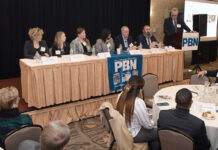To verify that a person is eligible to work in the United States, employers are required to ask to see proof of identity and proof of citizenship or legal status: a driver’s license and a Social Security card, for example, or a passport.
As long as they act in good faith and document what the worker gives them, there isn’t much else employers can legally do to verify employment eligibility.
But with new laws, and penalties, related to this process on the horizon, human resources professionals are becoming more concerned about their practices.
“It has become a hot-button issue … with the enforcement activity,” said William E. O’Gara, a labor lawyer with Pannone Lopes & Devereaux LLC in Providence. “Employers are recognizing the fact that the status quo, which has been in place since the Immigration Reform and Control Act of 1986, is not going to last for long. There are changes afoot, and there will be more changes.”
The main changes are the implementation of a mandatory electronic verification system, which would come with the threat of prison time and fines for noncompliance, and new penalties for ignoring “no-match” letters.
“If a business has been remitting Social Security contributions for the wrong name, they will get a no-match letter,” he said. “It’s a letter saying the Social Security number doesn’t match the name. Right now if the employer ignores that, there are no consequences. But the proposed regulations would have them actively follow up on the letter and be fined if they didn’t do that.”
An even bigger concern for human resources professionals is legislation involving the federal Basic Pilot electronic employment verification system. Currently this is a voluntary program, but bills being considered by Congress and and the R.I. House and Senate soon may change that.
Although most individuals in the industry would like to see a system to simplify the process and make it more accurate, many also harbor concerns about moving too fast.
“There’s hesitation to jumping into those systems,” said David Goldman, president of the Human Resource Management Association of Rhode Island, a local chapter of the Society for Human Resource Management.
“One thing we have constantly said is that we’re all for it, but the program is highly inaccurate,” Goldman said. “As much as 14 percent of the people they’ve processed through it came back as unauthorized to work in the U.S. because of a glitch in the system. Yes, we’re in favor of a system, but one that works.”
There are also concerns about the capacity of the Web-based system, which is administered by the U.S. Department of Homeland Security. It now handles the requests of only 13,000 businesses nationwide and has been unable to provide “accurate and timely” responses.
There are also concerns about the extra work, and possible fines, it would create.
“The version we’ve been hearing about in the Rhode Island legislature has some unusual characteristics, like that you would have to re-register every 60 days,” said Goldman. “If you forget, you will be fined.”
And then there is the subject of lawsuits.
“If you deny someone a job and the reason given is the system kicked their name back, there’s no telling what a private person could do” if the rejection was erroneous, Goldman said.
O’Gara said that he is already seeing more lawsuits from people based on being denied employment.
“Right now employers are on a tightrope, because if you reject someone because you suspect they’re illegal and they’re legal, you open yourself up to a lawsuit,” said O’Gara. “Those have become more common in recent years. They’re supposed to ask for certain information, but if they go further, they are opening themselves up to a lawsuit.”
Carrie Beers, manager of the human resources consultant group at USI New England, said these concerns have led to serious discussions among HR experts and will remain at the forefront of professionals’ concerns.
“I’m starting to see more and more people discussing it, because they want to see a system that’s efficient and is able to identify the false documentation and one that can protect citizens from identity theft,” Beers said.
“But the fear is how can they do this verification with a quick turnaround, so money isn’t wasted, and number two is, they don’t want to be fined.”
Goldman added, “The last thing you want to do is make it harder for private businesses to do their business.”
No posts to display
Sign in
Welcome! Log into your account
Forgot your password? Get help
Privacy Policy
Password recovery
Recover your password
A password will be e-mailed to you.











